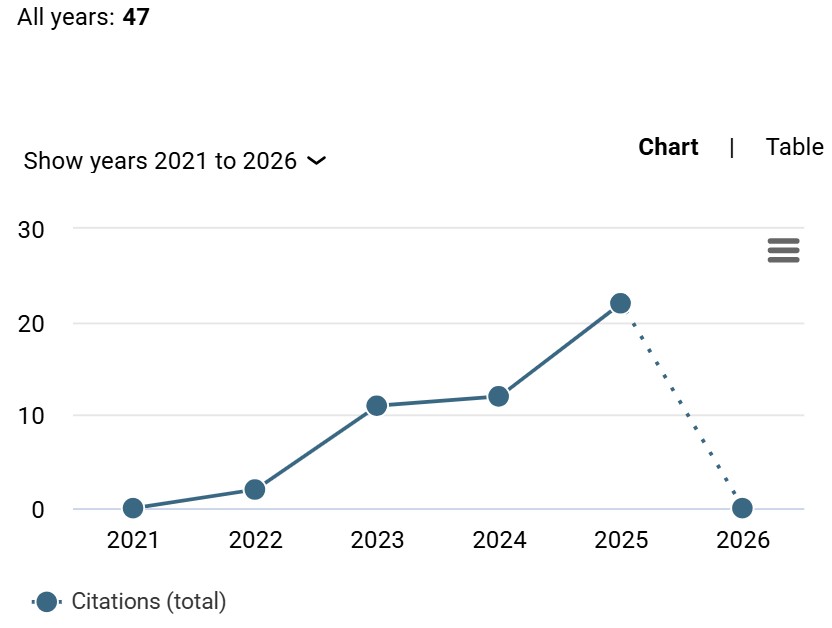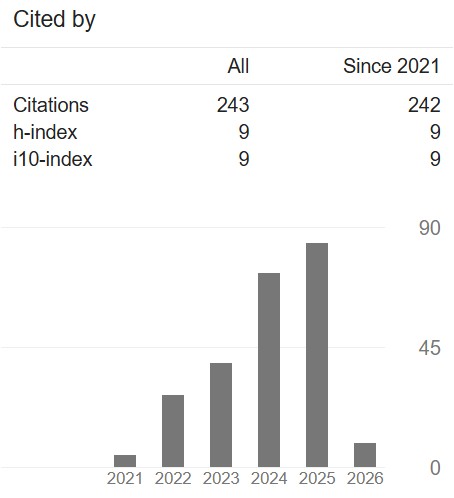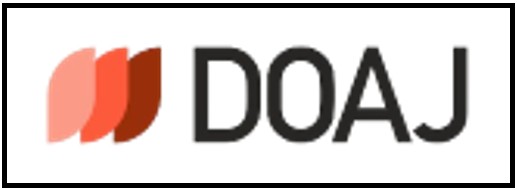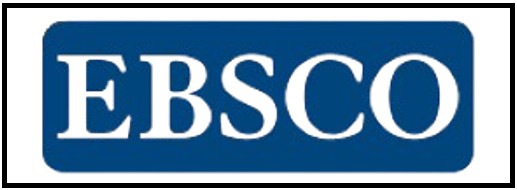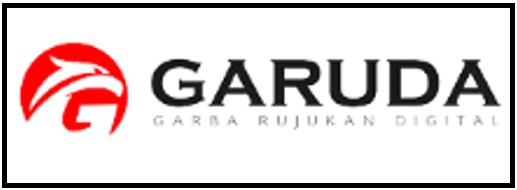Relationship between fish consumption and nutritional status and learning achievement of vocational high school students in Mejayan Village, Madiun Regency
Abstract
Vocational High School (SMK) is a secondary school that aims to produce quality human resources for those who are ready to work at a productive age. SMK-level schools are inhabited by teenage children at the age–15-17 years. Teenagers at that age need adequate nutritional intake, both in quality and quantity, for their growth and development, both in terms of health and non-health. Fish is a food ingredient with a variety of health and non-health benefits. The health benefits of fish are in the form of good nutritional status, while in the non-health aspect, it improves cognitive aspects in the form of learning achievements at school. This study aimed to investigate the relationship between fish consumption, nutritional status, and learning achievement among vocational students in Mejayan Village. The study used a cross-sectional design with 177 students, and data were collected through questionnaires, anthropometric measurements of IMT/U, food recall 1 × 24 hours, and report card scores. Data analysis using the Chi-Square method The results showed that the fish consumption level of vocational high school students in Mejayan Village was low at 8.18 kg/capita/year and there was no significant relationship with nutritional status (p=0.911) or learning achievement (p=0.422). The absence of a relationship between the two variables may be due to factors other than fish consumption that influence the results. Based on this research, education on the importance of fish consumption for students is needed to increase the benefits of their nutritional and cognitive status.
References
Abduh, M., Alawiyah, T., Apriansyah, G., Sirodj, R. A., & Afgani, M. W. (2022). Survey Design: Cross Sectional dalam Penelitian Kualitatif. Jurnal Pendidikan Sains Dan Komputer, 3(01), 31–39. https://doi.org/10.47709/jpsk.v3i01.1955
Aberg, M. A. L., Aberg, N., Brisman, J., Sundberg, R., Winkvist, A., & Torén, K. (2009). Fish intake of Swedish male adolescents is a predictor of cognitive performance. Acta Paediatrica Journal, 98(3), 555–560. https://doi.org/10.1111/j.1651-2227.2008.01103.x
Amalia, R. N., Sulastri, D., & Semiarty, R. (2016). Hubungan Konsumsi Junk Food dengan Status Gizi Lebih pada Siswa SD Pertiwi 2 Padang. Jurnal Kesehatan Andalas, 5(1). https://doi.org/10.25077/jka.v5i1.466
Ashad, H. K. P., Sudarmo, A. P., & Mudzakir, A. K. (2024). Analysis of Adolescent Fish Consumption Levels at Vocational High School Level In Mejayan District, Madiun Regency. Jurnal Perikanan Unram, 14(3), 1733–1744. https://doi.org/10.29303/jp.v14i3.1064
Budiman, L. A., Rosiyana, R., Sari, A. S., Safitri, S. J., Prasetyo, R. D., Rizqina, H. A., Neng I Kasim, I. S., & Indriany Korwa, V. M. (2021). Analisis Status Gizi Menggunakan Pengukuran Indeks Massa Tubuh dan Beban Kerja dengan Metode 10 Denyut pada Tenaga Kesehatan. Nutrizione: Nutrition Research And Development Journal, 1(1), 6–15. https://doi.org/10.15294/nutrizione.v1i1.48359
Carwile, J. L., Butler, L. J., Janulewicz, P. A., Winter, M. R., & Aschengrau, A. (2016). Childhood Fish Consumption and Learning and Behavioral Disorders. International Journal of Environmental Research and Public Health, 13(11). https://doi.org/10.3390/ijerph13111069
Dasih, D. A. S. A., Saptariana, & Astuti, P. (2017). Hubungan Antara Kebiasaan Makan Ikan dengan Status Gizi Balita Usia 6-59 Bulan pada Keluarga Nelayan RW 01 Desa Nyamplungsari Kecamatan Petarukan Kabupaten Pemalang. Food Science and Culinary Education Journal, 6(2), 70–76. https://doi.org/10.15294/focuze.v6i2.20014
Demu, Y. D. B., Costa, S. L. D. V. da, Maria, R. M., & Kemenkes Kupang, P. (2023). Pengaruh Pola Konsumsi Anak Sekolah Dasar Terhadap Status Gizi (IMT/U) di Desa Oeltua Kecamatan Taibenu Kabupaten Kupang. Jurnal Ilmiah Multidisiplin, 2(11), 5379-5386. https://doi.org/10.56799/jim.v2i11.2402
Dian, Atmadja, T. F. A. G., & Kosnayani, A. S. (2023). Hubungan Lama Hemodialisis Dengan Nafsu Makan Dan Status Gizi Pada Pasien Penyakit Ginjal Kronis. Jurnal SAGO Gizi Dan Kesehatan, 5(1), 37. https://doi.org/10.30867/gikes.v5i1.1250
Dighriri, I. M., Alsubaie, A. M., Hakami, F. M., Hamithi, D. M., Alshekh, M. M., Khobrani, F. A., Dalak, F. E., Hakami, A. A., Alsueaadi, E. H., Alsaawi, L. S., Alshammari, S. F., Alqahtani, A. S., Alawi, I. A., Aljuaid, A. A., & Tawhari, M. Q. (2022). Effects of Omega-3 Polyunsaturated Fatty Acids on Brain Functions: A Systematic Review. Cureus Journal, 14(1). https://doi.org/10.7759/cureus.30091
Fakhrezi, M. A., Putra, M. Y., Syifa, N., Julianto, R., & Siswanto. (2024). Sosialisasi Gemar Makan Ikan Kepada Anak-anak SDN Sungai Kusi di Desa Gunung Manau, Kecamatan Batumandi, Kabupaten Balang, Kalimantan Selatan. Jurnal Pengabdian Sosial, 1(7), 667-672. http://dx.doi.org/10.59837/44m88e91
Hafiza, D., Utmi, A., & Niriyah, S. (2021). Hubungan Kebiasaan Makan Dengan Status Gizi Pada Remaja SMP YLPI Pekanbaru. Al-Asalmiya Nursing Jurnal Ilmu Keperawatan (Journal of Nursing Sciences), 9(2), 86–96. https://doi.org/10.35328/keperawatan.v9i2.671
Handayani, I. A. P., & Murniati, D. E. (2020). Pembuatan Mackerel Chees Tart Dengan Substitusi Tengiri Untuk Era Milenial. Prosiding Pendidikan Teknik Boga Busana FT UNY, 15(1), 1-6.
Indrawan, G. S., Padmiswari, A. A. I. M., Sukma, N. W., Ida, A. M. D., Nadya, T. W., Nengah Adiana, I., Gede Sutrisna, P., & Tresna Wicaksana, I. (2024). Edukasi Mengenai Nilai Gizi Dan Kesehatan Mengkonsumsi Ikan Di Sekolah Dasar (Education on The Nutritional and Health Value of Consuming Fish in Primary Schools). JAI: Jurnal Abdimas ITEKES Bali, 3(2), 143–148. https://ejournal.itekes-bali.ac.id/jai
Kamilah, S. N., Supriati, R., Haryanto, H., Sipriyadi, & Atmaja, V. Y. (2022). Pemeriksaan Status Gizi berdasarkan Nilai Indeks Massa Tubuh pada Anak Usia 10-12 Tahun di SDN 159 Bengkulu Utara. Indonesian Journal of Community Empowerment and Service (ICOMES), 2(2), 95–100. https://doi.org/10.33369/icomes.v2i2.25579
Kementerian Kesehatan Republik Indonesia BKPK [Badan Kebijakan Penyelenggara Kesehatan]. (2023). Survei Kesehatan Indonesia (SKI) Tahun 2023. Diakses pada tanggal 12 Maret 2025, dari https://www.badankebijakan.kemkes.go.id/laporan-tematik-ski/
Kementerian Kelautan dan Perikanan [KKP]. (2024). Laporan Kinerja Kementerian Kelautan dan Perikanan 2023. Diakses pada tanggal 7 Maret 2025, dari https://kkp.go.id/download-pdf-akuntabilitas-kinerja/akuntabilitas-kinerja-pelaporan-kinerja-laporan-kinerja-kkp-2023.pdf
Kim, J.-L., Winkvist, A., Aberg, M. A. I., Aberg, N., Sundberg, R., Torén, K., & Brisman, J. (2010). Fish Consumption And School Grades In Swedish Adolescents: a Study of The Large General Population. Acta Paediatrica Journal, 99(1), 72–77. https://doi.org/10.1111/j.1651-2227.2009.01545.x
Kubaya, S., Rahayu, A., & Surasno, D. M. (2020). Pengaruh Konsumsi Ikan Terhadap Prestasi Belajar Anak SD 58 dan SD 65 Kota Ternate. Jurnal Ilmiah Serambi Sehat, 13(1), 35–43. Diakses pada tanggal 19 Maret 2025, dari https://jurnal.ummu.ac.id/index.php/serambisehat/article/view/633
Kusmiyati, Rasmi, D. A. C., Sedijani, P., & Sativa, D. Y. (2023). Ayo Penuhi Zat Gizi Protein Dengan Konsumsi Ikan. Jurnal Pengabdian Magister Pendidikan IPA, 6(4). https://doi.org/10.29303/jpmpi.v6i4.6679
Munde, A. P. I., Suarjana, I. M., & Suiraoka, I. P. (2020). Tingkat Konsumsi Ikan dan Prestasi Belajar Anak di SDN 8 Padang Sambian Kaja Denpasar. Journal of Nutrition Science, 9(2), 68–72. https://doi.org/10.33992/jig.v9i2.802
Nasution, A. S., Nuraida, I., Putri, D. L., Raharsari, R. T., & Suhenda, D. (2023). Determinan Status Gizi Remaja Usia 12-16 Tahun. Jurnal Ilmiah Keperawatan STIKES Hang Tuah Surabaya, 18(2), 128–135. https://doi.org/https://doi.org/10.30643/jiksht.v18i2.324
Nurulhaq, F., Riyadi, H., & Aries, M. (2022). Hubungan Keadaan Sosial Ekonomi dan Konsumsi Ikan dengan Status Gizi Anak di Desa Sukajaya, Lempasing, Kabupaten Pesawaran, Lampung. Jurnal Ilmu Gizi Dan Dietetik, 1(2), 88–94. https://doi.org/10.25182/jigd.2022.1.2.88-94
Prantika, D. M., & Nurhayati, F. (2017). Hubungan Antara Tingkat Kecukupan Gizi Dengan Status Gizi Mahasiswa Jurusan Pendidikan Olahraga Angkatan 2014. Jurnal Pendidikan Olahraga Dan Kesehatan, 5(3), 406–412. Diakses pada tanggal 19 April 2025, dari http://ejournal.unesa.ac.id/index.php/jurnal-pendidikan-jasmani/issue/archive
Ramadhany, T., & Handayani, D. (2020). Perilaku Mengonsumsi Ikan Dan Pengaruhnya Terhadap Kemampuan Kognitif. Jurnal Sosial Ekonomi Kelautan Dan Perikanan, 15(2), 223. https://doi.org/10.15578/jsekp.v15i2.7930
Scaglioni, S., De Cosmi, V., Ciappolino, V., Parazzini, F., Brambilla, P., & Agostoni, C. (2018). Factors Influencing Children’s Eating Behaviours. Nutrients, 10(6), 706. https://doi.org/10.3390/nu10060706
Syafi’i, A., Marfiyanto, T., & Rodiyah, S. K. (2018). Studi Tentang Prestasi Belajar Siswa Dalam Berbagai Aspek dan Faktor Yang Mempengaruhi. Jurnal Komunikasi Pendidikan, 2(2), 115. https://doi.org/10.32585/jkp.v2i2.114
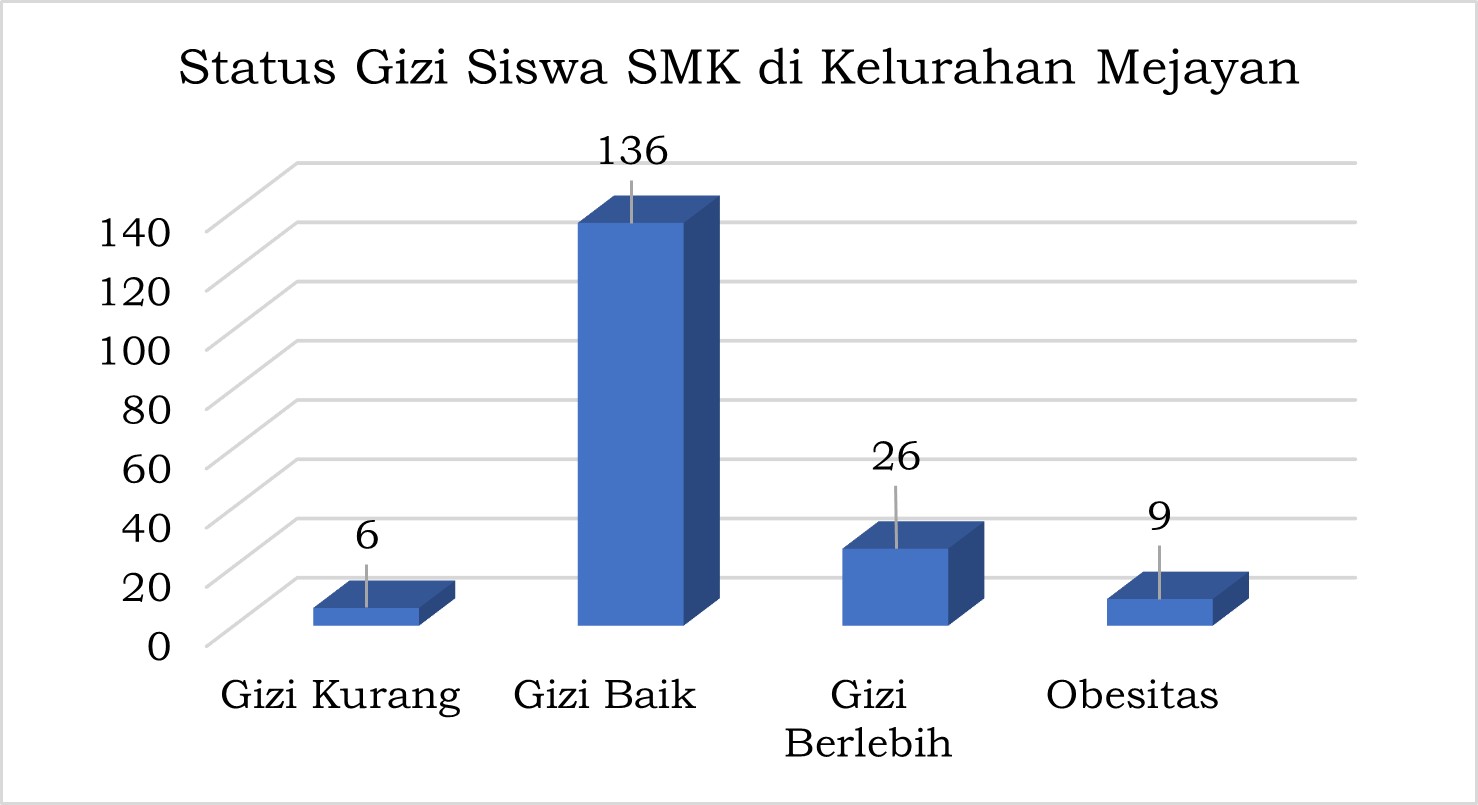
Copyright (c) 2025 Haendra Kusuma Putra Ashad, Agnes Puspitasari Sudarmo, Abdul Kohar Mudzakir

This work is licensed under a Creative Commons Attribution-ShareAlike 4.0 International License.
Copyright on articles was retained by the respective author(s) without restrictions. The author grants the journal its first publication rights with the work simultaneously licensed under the Creative Commons Attribution-ShareAlike 4.0 International (CC BY-SA) license. This means anyone is free to copy, transform, or redistribute articles for any lawful purpose in any medium, provided they give appropriate attribution to the original author(s).





